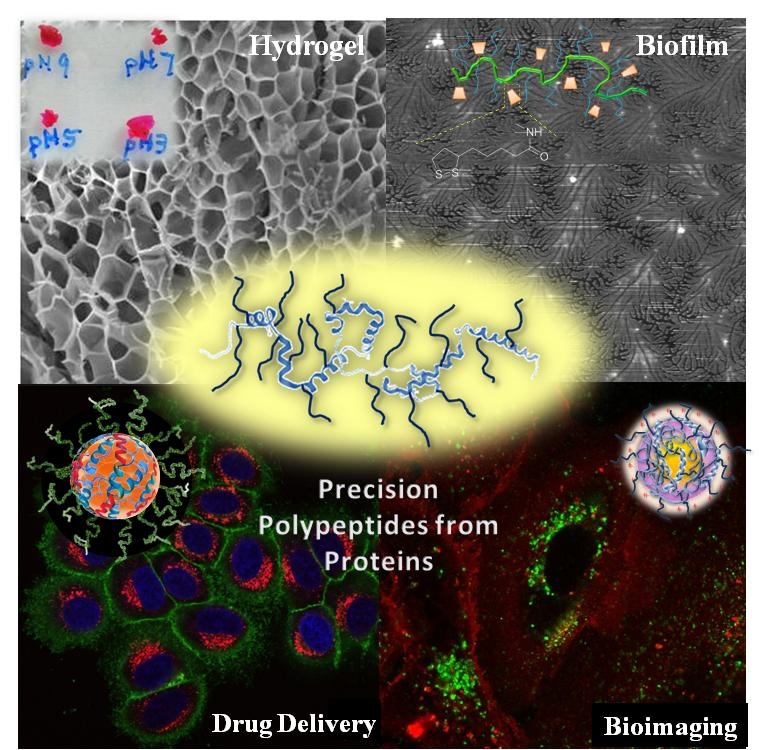 Existing small molecular therapeutics often elicit severe side effects due to the systemic distribution of cytostatic drugs. To improve therapeutic efficacy and reduce toxicity, developing of efficient drug delivery platforms is attracting an exponentially growing attention in the last decades. Proteins are particularly attractive materials for developing drug delivery systems since they are originated from biological systems and can be easily degraded by endogenous enzymes, therefore they have reduced toxicity risk. However, using native protein to construct drug delivery platforms is limited by the variations of proteins and tedious modifications. We have developed a comprehensive and highly versatile approach to prepare protein based polypeptide copolymers (PbPs) from natural proteins with distinct molecular weights, chain lengths, ordered secondary structural elements and high numbers of functional groups. To achieve such copolymers, a novel method has been established to unfold the globular structure of native proteins under controlled condition and in situ stabilize the polypeptide backbone by grafting polyethylene(oxide) (PEO) chains to avoid precipitation. Such PbPs possess the benefits of protein based materials, such as monodisperse chain length, ordered secondary structures, biocompatibility and biodegradability. In addition, their unfolded backbone enables more flexible modifications and opens up further possibilities to re-assemble the backbone under desired conditions. We built up various unique hybrid materials from these copolymers for a broad range of biomedical applications, such as patterned biofilms, environmental responsive hydrogel matrix, multi-stimuli responsive drug delivery systems, efficient gene delivery carriers as well as multifunctional nanomicelles for spontaneously MRI imaging and therapy.
Existing small molecular therapeutics often elicit severe side effects due to the systemic distribution of cytostatic drugs. To improve therapeutic efficacy and reduce toxicity, developing of efficient drug delivery platforms is attracting an exponentially growing attention in the last decades. Proteins are particularly attractive materials for developing drug delivery systems since they are originated from biological systems and can be easily degraded by endogenous enzymes, therefore they have reduced toxicity risk. However, using native protein to construct drug delivery platforms is limited by the variations of proteins and tedious modifications. We have developed a comprehensive and highly versatile approach to prepare protein based polypeptide copolymers (PbPs) from natural proteins with distinct molecular weights, chain lengths, ordered secondary structural elements and high numbers of functional groups. To achieve such copolymers, a novel method has been established to unfold the globular structure of native proteins under controlled condition and in situ stabilize the polypeptide backbone by grafting polyethylene(oxide) (PEO) chains to avoid precipitation. Such PbPs possess the benefits of protein based materials, such as monodisperse chain length, ordered secondary structures, biocompatibility and biodegradability. In addition, their unfolded backbone enables more flexible modifications and opens up further possibilities to re-assemble the backbone under desired conditions. We built up various unique hybrid materials from these copolymers for a broad range of biomedical applications, such as patterned biofilms, environmental responsive hydrogel matrix, multi-stimuli responsive drug delivery systems, efficient gene delivery carriers as well as multifunctional nanomicelles for spontaneously MRI imaging and therapy.
Representative publications:
1. Yuzhou Wu*, Chuang Li, Felix Boldt, Christina Förtsch, Holger Barth, Yanran Wang, Seah Ling Kuan, Thuy Tam Tran, Viktoria Mikhalevich, Zhongqiang Yang, Dongsheng Liu*, Tanja Weil*, “Programmable protein–DNA hybrid hydrogels for the immobilization and release of functional proteins”, Chem. Comm., 2014, 50, 14620-14622.
2. David Yuen Wah Ng#, Yuzhou Wu#, Seah Ling Kuan and Tanja Weil*, “Programming Supramolecular Biohybrids as Precision Therapeutics”, Acc. Chem. Res., 2014, 47, 3471-3480.
3. Yuzhou Wu, Susann Ihme, Michaela Feuring-Buske, Seah Ling Kuan, Klaus Eisele, Markus Lamla, Yanran Wang, Christian Buske, and Tanja Weil. A core-shell albumin copolymer nanotransporter for high capacity loading and two-step release of doxorubicin with enhanced anti-leukemia activity. Adv. Healthcare Mater., 2012, doi: 10.1002/adhm.201200296.

